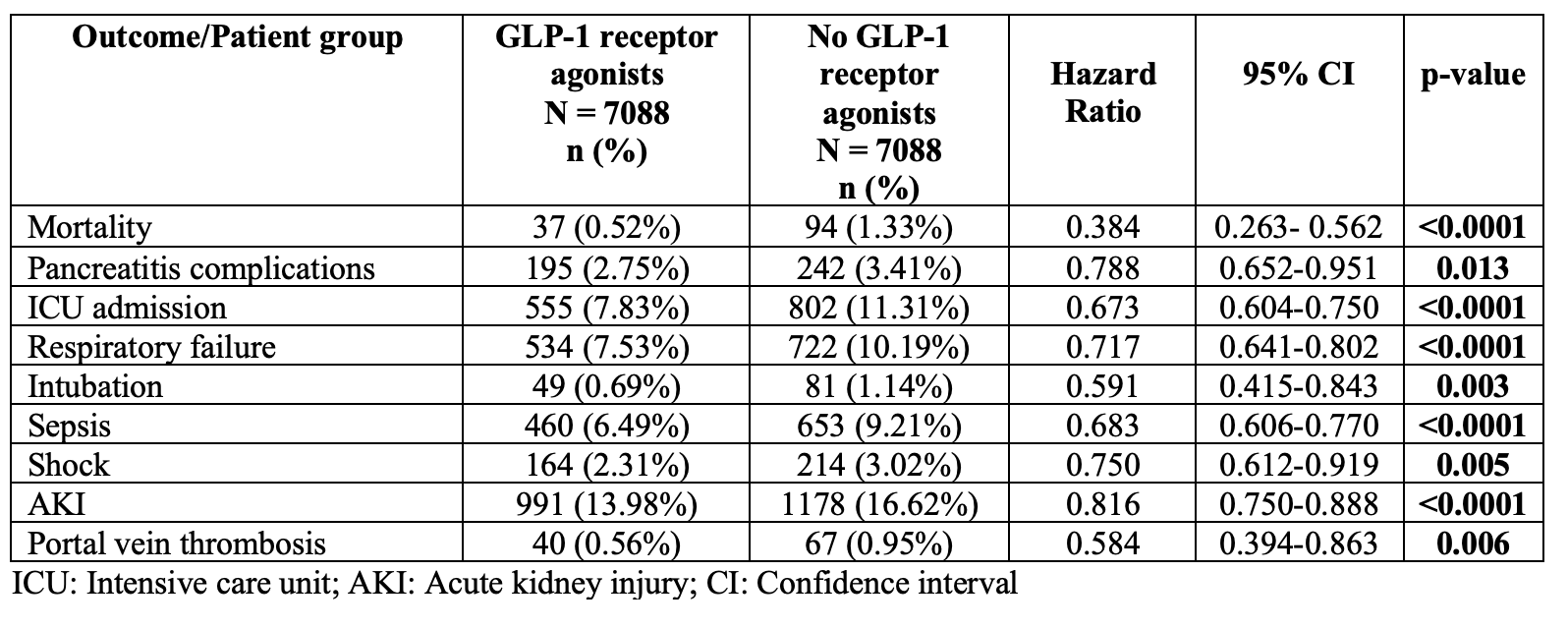Sunday Poster Session
Category: Biliary/Pancreas
P0079 - Turning the Tide: GLP-1 Agonists Improve Outcomes in Patients With Obesity Admitted With Acute Pancreatitis
Sunday, October 26, 2025
3:30 PM - 7:00 PM PDT
Location: Exhibit Hall
- AM
Aun Muhammad, MD
University of Mississippi Medical Center
Flowood, MS
Presenting Author(s)
Award: ACG Presidential Poster Award
Aun Muhammad, MD1, Zehra Naseem, MD2, Elizabeth Paine, MD3
1University of Mississippi Medical Center, Flowood, MS; 2Cleveland Clinic, Cleveland, OH; 3G.V. (Sonny) Montgomery VA Medical Center, University of Mississippi Medical Center, Madison, MS
Introduction: Glucagon-like peptide-1 receptor agonists (GLP-1RAs) are used in patients with obesity. The association between GLP-1RAs and the risk of acute pancreatitis (AP) remains unclear, and the outcomes among patients who develop AP while on GLP-1RAs have not been evaluated. Our aim was to evaluate 6 months outcomes of patients with obesity admitted with AP who were on GLP-1RAs vs those with no exposure to GLP-1RAs.
Methods: We performed a retrospective cohort study using the TrinNetX database, a comprehensive multi-institutional dataset. The study included patients aged ≥ 18 years and BMI ≥30 kg/m2 diagnosed with acute pancreatitis from 1/1/2014 to 4/30/2025. Patients with any history of chronic pancreatitis were excluded. Patients were categorized based on whether they received
GLP-1RAs
(at least one month before the episode of acute pancreatitis) or did not undergo such treatment. The
GLP-1RAs
in our study were: Semaglutide, Liraglutide, Dulaglutide, Tirzepatide, Exenatide, and Lixisnatide. The primary aim was to assess outcomes of acute pancreatitis at 6 months. One to one propensity score matching was applied for age, gender, race, tobacco and alcohol use, comorbidities, and BMI.
Results: Following propensity matching, a total of 7088 patients were included in the analysis for each group. Patients on GLP-1RAs had a lower risk of mortality, pancreatitis complications, ICU admission, respiratory failure, intubation, sepsis, AKI, shock, and portal vein thrombosis at 6 months as compared to patients with no exposure to GLP-1RAs (Table 1).
Discussion: This large, multicenter, retrospective cohort study provides novel and compelling evidence that GLP-1RAs use is associated with improved 6-month outcomes in obese patients hospitalized with acute pancreatitis. Contrary to previous concerns that GLP-1RAs might increase the risk of pancreatitis, our results suggest a protective or benign influence on disease trajectory once pancreatitis has occurred.

Figure: Table 1: Comparative 6 months outcomes of patients with obesity admitted with acute pancreatitis who were on GLP-1RAs vs those with no exposure to GLP-1RAs
Disclosures:
Aun Muhammad indicated no relevant financial relationships.
Zehra Naseem indicated no relevant financial relationships.
Elizabeth Paine indicated no relevant financial relationships.
Aun Muhammad, MD1, Zehra Naseem, MD2, Elizabeth Paine, MD3. P0079 - Turning the Tide: GLP-1 Agonists Improve Outcomes in Patients With Obesity Admitted With Acute Pancreatitis, ACG 2025 Annual Scientific Meeting Abstracts. Phoenix, AZ: American College of Gastroenterology.
Aun Muhammad, MD1, Zehra Naseem, MD2, Elizabeth Paine, MD3
1University of Mississippi Medical Center, Flowood, MS; 2Cleveland Clinic, Cleveland, OH; 3G.V. (Sonny) Montgomery VA Medical Center, University of Mississippi Medical Center, Madison, MS
Introduction: Glucagon-like peptide-1 receptor agonists (GLP-1RAs) are used in patients with obesity. The association between GLP-1RAs and the risk of acute pancreatitis (AP) remains unclear, and the outcomes among patients who develop AP while on GLP-1RAs have not been evaluated. Our aim was to evaluate 6 months outcomes of patients with obesity admitted with AP who were on GLP-1RAs vs those with no exposure to GLP-1RAs.
Methods: We performed a retrospective cohort study using the TrinNetX database, a comprehensive multi-institutional dataset. The study included patients aged ≥ 18 years and BMI ≥30 kg/m2 diagnosed with acute pancreatitis from 1/1/2014 to 4/30/2025. Patients with any history of chronic pancreatitis were excluded. Patients were categorized based on whether they received
GLP-1RAs
(at least one month before the episode of acute pancreatitis) or did not undergo such treatment. The
GLP-1RAs
in our study were: Semaglutide, Liraglutide, Dulaglutide, Tirzepatide, Exenatide, and Lixisnatide. The primary aim was to assess outcomes of acute pancreatitis at 6 months. One to one propensity score matching was applied for age, gender, race, tobacco and alcohol use, comorbidities, and BMI.
Results: Following propensity matching, a total of 7088 patients were included in the analysis for each group. Patients on GLP-1RAs had a lower risk of mortality, pancreatitis complications, ICU admission, respiratory failure, intubation, sepsis, AKI, shock, and portal vein thrombosis at 6 months as compared to patients with no exposure to GLP-1RAs (Table 1).
Discussion: This large, multicenter, retrospective cohort study provides novel and compelling evidence that GLP-1RAs use is associated with improved 6-month outcomes in obese patients hospitalized with acute pancreatitis. Contrary to previous concerns that GLP-1RAs might increase the risk of pancreatitis, our results suggest a protective or benign influence on disease trajectory once pancreatitis has occurred.

Figure: Table 1: Comparative 6 months outcomes of patients with obesity admitted with acute pancreatitis who were on GLP-1RAs vs those with no exposure to GLP-1RAs
Disclosures:
Aun Muhammad indicated no relevant financial relationships.
Zehra Naseem indicated no relevant financial relationships.
Elizabeth Paine indicated no relevant financial relationships.
Aun Muhammad, MD1, Zehra Naseem, MD2, Elizabeth Paine, MD3. P0079 - Turning the Tide: GLP-1 Agonists Improve Outcomes in Patients With Obesity Admitted With Acute Pancreatitis, ACG 2025 Annual Scientific Meeting Abstracts. Phoenix, AZ: American College of Gastroenterology.

